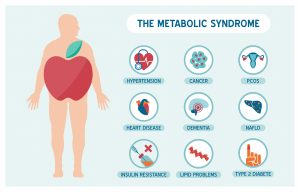
Want to keep the old grey matter in shape? It’s not just crosswords, learning new languages or a musical instrument that can help. Bariatric surgery and weight loss control may be a cognitive helper too – as the Winnett Specialist Group doctors Mr Jason Winnett (Bariatric & Laparoscopic Surgeon) and Dr Audrey Kotzander (GP) reveal.
Blood pressure. Cholesterol. Cancer. Non-alcoholic Fatty Liver Disease.
“There are countless chronic medical conditions associated with obesity and metabolic disease, but what is less known within the patient community is the impact on cognitive decline with weight gain,” says GP Dr Audrey Kotzander.
One study of 6582 patients reported in the International Journal of Epidemiology*1, found women with central weight obesity had a 39% increased risk of dementia.
Other research*2 suggests that obesity-triggering vascular dementia decreases not only blood supply to the brain, but also increases fat cells that damage the brain’s white matter, leading to a loss of cognitive and intellectual behaviour.
“Obesity is a very complex illness,” says Dr Kotzander. “Patients are more likely to dismiss a bit of knee pain, or a few extra kilograms around their tummy. But once you explain that severe obesity can cause neurodegenerative changes it adds a new perspective.
“What is most interesting is that large studies show that it’s the mid-life obesity increases that has more impact on dementia risk, rather than having a higher BMI in the later years of life*3.”
So, what does the latest study on bariatric surgery and cognitive decline show?
“Just as bariatric surgery often shows improvements to sleep apnoea, knee pain and other chronic illnesses, bariatric surgery may also help reduce early brain decline which appears to be more rapid in individuals with obesity, “says Mr Winnett of the study in the Journal of Nutrition Health & Aging.*4”
The study assessed 85 bariatric surgery patients at two-year-follow up and performed a collection of memory and language tests as well as auditory verbal learning tests.
“Although one recall test showed decline, those patients who underwent bariatric surgery had stable cognition two years down the track for the remainder of the tests, and there were improvements in executive function,” he said.
A separate JAMA study on 133 bariatric patients, mostly women*5, found that two years after bariatric surgery:
✓ 11% of participants improved working memory by 11%
✓ 31% demonstrated improvements in episodic memory.
✓ 24% showed improvement in verbal fluency.
✓ 40% were better able to shift their attention.

Dementia is a lesser known symptom in the metabolic equation.
Mr Winnett says patients are often aware that vascular diabetes impacts the risk of dementia, because “the vessels in the brain and ears are among the smallest and most fragile in the body.”
“However more and more evidence is emerging that neurodegenerative pathways in the brain have an impact on all three diseases*6 – obesity, diabetes and Alzheimer’s.”
He says patients struggling with diabetes and obesity are wise to remember that the human brain is “the body’s command centre.”
“The brain controls how we feel, learn and recall.
“In order for it to be efficient, it uses sugar in the body for energy – in fact uses about half of all the sugar energy in the body to function properly.
“So, when sugar levels fall outside of the normal range it can cause nerve damage to the delicate vessels in the brain, the same way that diabetes can cause damage to the nerves in the feet.”
“This can contribute to problems with learning, remembering, and mood issues over time and certainly later Alzheimer’s and dementia.”
What is the difference between Alzheimer’s and dementia anyhow?
“Dementia is a general term for the decline in mental ability that is severe enough to interfere with daily life, while Alzheimer’s is a specific form of dementia and the most common cause of dementia,” says Mr Winnett.
“But whatever you call it, we know obesity is involved and that weight loss is one of the most modifiable ways to help prevent brain decline.”
At Winnett Specialist Group, we look after people, not just conditions. If you’re struggling with weight management and concerned about its impact on your overall and cognitive health, we’re here to help. Our specialists, Mr. Jason Winnett and Dr. Audrey Kotzander, are dedicated to providing care that supports both your body and mind. To book a consultation with us, click here.

Mr Jason Winnett
Laparoscopic and Bariatric Surgeon

Dr. Audrey Kotzander
Bariatric Physician
P (03) 9417 1555
admin@winnettspecialistgroup.com.au
www.winnettspecialistgroup.com.au
Queens Terrace, 382 Victoria Parade, East Melbourne 3002
Sources
2, Does obesity increase the risk of dementia? Cureus May 2018
5 Long-Term Brain Structure and Cognition Following Bariatric Surgery, JAMA 2024



